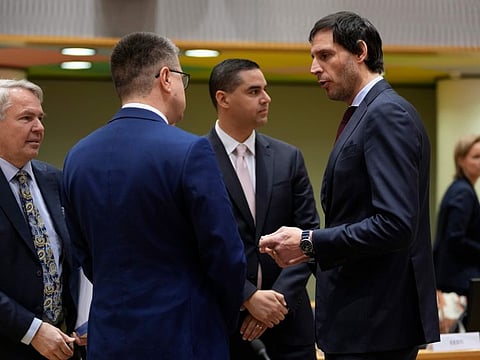EU imposes new sanctions on Iran over protest crackdown
27-nation EU has so far stopped short of blacklisting the Revolutionary Guards

Brussels: The EU on Monday placed 37 more Iranian officials and entities on an asset-freeze and visa-ban blacklist over Tehran’s bloody crackdown on protesters, officials said.
The fourth round of sanctions against Tehran over its repression of demonstrators was adopted by the bloc’s foreign ministers meeting in Brussels.
The full list of names was to be given in the EU’s official journal later on Monday.
The bloc has already imposed sanctions on more than 60 Iranian officials and entities over the crackdown on protestors, including targeting Tehran’s “morality police”, Revolutionary Guard Corps commanders and state media.
But the 27-nation EU has so far stopped short of blacklisting the Revolutionary Guards themselves as a terror group despite calls from Germany and the Netherlands to do so.
Iran has warned the bloc against taking the move and EU officials are wary that it could kill off stalled attempts to revive the 2015 deal on Tehran’s nuclear programme being mediated by Brussels.
EU foreign policy chief Josep Borrell insisted that there needed first to be a legal ruling in an EU member state first before the bloc could make the move.
“You cannot say: ‘I consider you a terrorist because I do not like you’,” Borrell said.
“It has to be done when a court of one member state issues a legal statement, a concrete condemnation.”
Demonstrations have swept Iran since the September 16 death in custody of Iranian Kurdish woman Mahsa Amini, 22, after her arrest in Tehran for allegedly failing to adhere to the Islamic republic’s strict dress rules.
Iran has arrested at least 14,000 people in the wave of protests, according to the United Nations.
Iranian authorities have executed four people for their role in the unrest and imposed the death penalty on a total of 18, triggering widespread international outrage.
The foreign ministers of France and Belgium urged the bloc to confront issue of Iran’s detention of EU citizens, seen as “hostage-taking” by rights groups and families of those detained.
“I think it is time that we Europeans think about how to respond to this policy of state hostage-taking that Iran is now practising,” French minister Catherine Colonna said.
“This must be taken into account in our thinking and in the decisions we will have to take in the future.”
Brussels is pushing for the release of Belgian aid worker Olivier Vandecasteele, who has been sentenced to over 12 years in jail on “espionage” charges decried by UN experts.
France said last week that it is “extremely worried” about the health of a French-Irish citizen Bernard Phelan held in Iran since since October.
Around two dozen foreigners and dual nationals are detained in Iran.
UK hits key judicial official in new wave of Iran sanctions
The UK on Monday sanctioned five more Iranian officials, including the deputy prosecutor general, over what it said was the “horrific violence” the regime was inflicting on its own people.
“These sanctions, alongside designations by the European Union and the United States, demonstrate the international community’s unified condemnation” of Tehran, the government said.
The UK has now imposed 50 sanctions on Iranian individuals and organisations, including Tehran’s prosecutor general last week, and deputy prosecutor general Ahmad Fazelian on Monday.
Iran on January 14 said it had executed British-Iranian dual citizen Alireza Akbari for spying for the UK prompting widespread Western outrage.
London said Fazelian was responsible “for a judicial system characterised by unfair trials and egregious punishments, including use of the death penalty for political purposes”.
“Alireza Akbari tragically became a victim of this brutal system,” the British government added.
Other individuals sanctioned Monday include Kiyumars Heidari, commander in chief of the Islamic Republic of Iran’s Ground Forces, and Hossein Nejat, the Islamic Revolutionary Guard Corps (IRGC) official in charge of security in Tehran.
“Those sanctioned today... are at the heart of the regime’s brutal repression of the Iranian people,” said UK Foreign Secretary James Cleverly.
“The UK and our partners have sent a clear message through these sanctions that there will be no hiding place for those guilty of the worst human rights violations,” he added.
The sanctions impose an asset freeze and UK travel ban on the targeted individuals.



